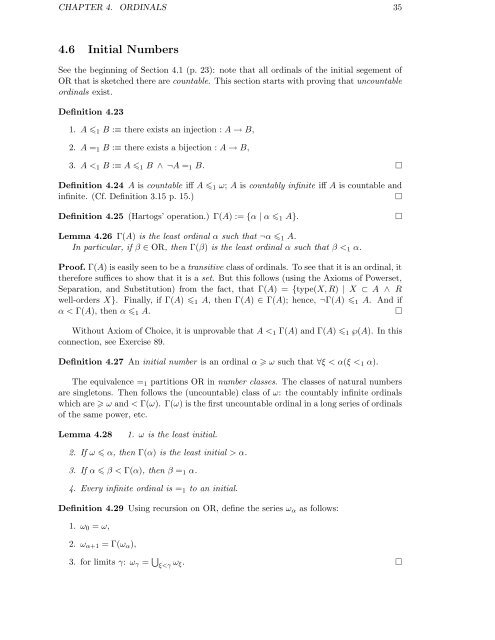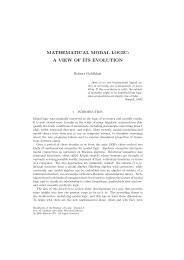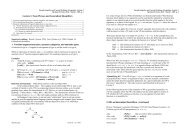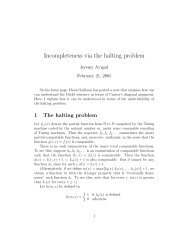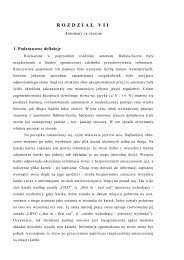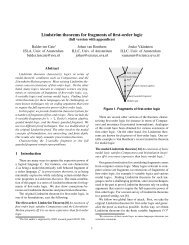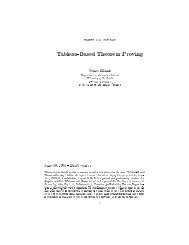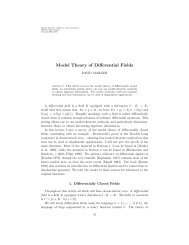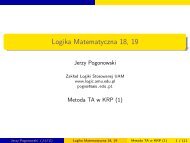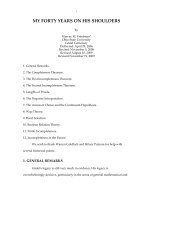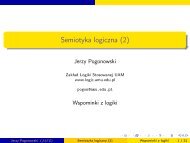Zermelo-Fraenkel Set Theory
Zermelo-Fraenkel Set Theory
Zermelo-Fraenkel Set Theory
You also want an ePaper? Increase the reach of your titles
YUMPU automatically turns print PDFs into web optimized ePapers that Google loves.
CHAPTER 4. ORDINALS 35<br />
4.6 Initial Numbers<br />
See the beginning of Section 4.1 (p. 23): note that all ordinals of the initial segement of<br />
OR that is sketched there are countable. This section starts with proving that uncountable<br />
ordinals exist.<br />
Definition 4.23<br />
1. A 1 B :≡ there exists an injection : A → B,<br />
2. A = 1 B :≡ there exists a bijection : A → B,<br />
3. A < 1 B :≡ A 1 B ∧ ¬A = 1 B. □<br />
Definition 4.24 A is countable iff A 1 ω; A is countably infinite iff A is countable and<br />
infinite. (Cf. Definition 3.15 p. 15.)<br />
□<br />
Definition 4.25 (Hartogs’ operation.) Γ(A) := {α | α 1 A}.<br />
□<br />
Lemma 4.26 Γ(A) is the least ordinal α such that ¬α 1 A.<br />
In particular, if β ∈ OR, then Γ(β) is the least ordinal α such that β < 1 α.<br />
Proof. Γ(A) is easily seen to be a transitive class of ordinals. To see that it is an ordinal, it<br />
therefore suffices to show that it is a set. But this follows (using the Axioms of Powerset,<br />
Separation, and Substitution) from the fact, that Γ(A) = {type(X, R) | X ⊂ A ∧ R<br />
well-orders X}. Finally, if Γ(A) 1 A, then Γ(A) ∈ Γ(A); hence, ¬Γ(A) 1 A. And if<br />
α < Γ(A), then α 1 A.<br />
□<br />
Without Axiom of Choice, it is unprovable that A < 1 Γ(A) and Γ(A) 1 ℘(A). In this<br />
connection, see Exercise 89.<br />
Definition 4.27 An initial number is an ordinal α ω such that ∀ξ < α(ξ < 1 α).<br />
The equivalence = 1 partitions OR in number classes. The classes of natural numbers<br />
are singletons. Then follows the (uncountable) class of ω: the countably infinite ordinals<br />
which are ω and < Γ(ω). Γ(ω) is the first uncountable ordinal in a long series of ordinals<br />
of the same power, etc.<br />
Lemma 4.28<br />
1. ω is the least initial.<br />
2. If ω α, then Γ(α) is the least initial > α.<br />
3. If α β < Γ(α), then β = 1 α.<br />
4. Every infinite ordinal is = 1 to an initial.<br />
Definition 4.29 Using recursion on OR, define the series ω α as follows:<br />
1. ω 0 = ω,<br />
2. ω α+1 = Γ(ω α ),<br />
3. for limits γ: ω γ = ⋃ ξ


